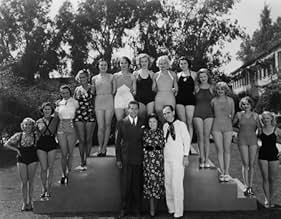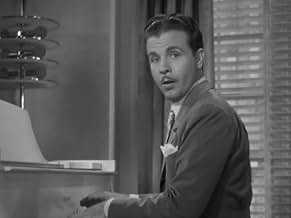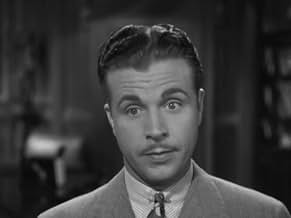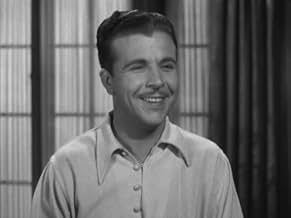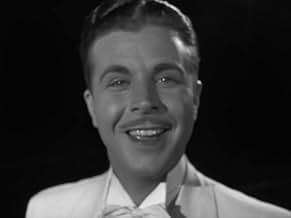VALUTAZIONE IMDb
6,4/10
1262
LA TUA VALUTAZIONE
Aggiungi una trama nella tua linguaWhen two investors inform an opportunistic dancer that they can't fund an elderly stage producer's production, she suggests they get an insurance policy on the producer's life.When two investors inform an opportunistic dancer that they can't fund an elderly stage producer's production, she suggests they get an insurance policy on the producer's life.When two investors inform an opportunistic dancer that they can't fund an elderly stage producer's production, she suggests they get an insurance policy on the producer's life.
- Candidato a 1 Oscar
- 1 candidatura in totale
Charles D. Brown
- Hugo
- (as Chas. D. Brown)
William B. Davidson
- Andy Callahan
- (as Wm. Davidson)
Bobbie Adams
- Chorus Girl
- (non citato nei titoli originali)
Iris Adrian
- Verna
- (non citato nei titoli originali)
Trama
Lo sapevi?
- QuizMultiple references to 'carloadings' being up, meaning an increase in the total amount of goods shipped by railroad. Back before stores and other businesses reported total monthly sales, carloadings was the best available measure of consumer spending.
- Blooper(at around 20 min) A string used to make a stack of books fall onto Dick Powell's head is clearly visible against the white paper background.
- Citazioni
Rosmer Peak: Would you call Andy if I kiss you?
Norma Perry: Not unless you want to kiss him too.
- Curiosità sui creditiThe usual disclaimer goes to great lengths to assure us that "The names of all characters -- The characters themselves -- The story - all incidents and institutions portrayed in this production are fictitious -- And no identification with actual persons, living or deceased, is intended or should be inferred."
- Versioni alternativeThere is an Italian edition of this film on DVD, distributed by DNA srl, "VIVA LE DONNE! (1933) + AMORE IN OTTO LEZIONI (1936)" (2 Films on a single DVD), re-edited with the contribution of film historian Riccardo Cusin. This version is also available for streaming on some platforms.
- ConnessioniEdited into Busby Berkeley and the Gold Diggers (1969)
- Colonne sonoreWith Plenty of Money and You
(1936)
Music by Harry Warren
Lyrics by Al Dubin
Sung by Dick Powell (uncredited)
Recensione in evidenza
Busby Berkeley's films are the most concentrated tease in the history of movies. it is over an hour into 'Gold Diggers of 1937' before we get any real meat - an astonishing, gossamer-erotic Gatsby-orgy filmed in the manner of Riefenstahl, all glowing Aryan bodies with their glistening mammillae, and idealised framing; with the kind of multi-character cutting of a song Paul Thomas Anderson would borrow for 'Magnolia'; and a magnificent extended tap-dance leading to an agreeable Berkeley fancy, the huge male dancer hand-standing over a bridge of female arms like a fly evading a web - after two tantalising duets featuring Dick Powell and Ruby Keeler that threaten to explode into full-blown imaginative hysteria, but are cut short.
Of course, this is the Berkeley method - coitus interruptus - and our deferred gratification is mirrored in a plot where the hero must prove himself worthy of the heroine before he can have her; the final extravaganza thus functions as a sexual/marriage rite, concluding in a consummating kiss. And what an extravaganza it is - less overt than '1935', but full of fetishised phallic implements, swirling clitoral circles and rocking chairs. Against a sharp black background, our phosphorescent heroes play out their immemorial rites, the heterosexual struggle linked to war (and not to the men's advantage). This idea leads to some striking sequences, including a priapic cannon with a pair of adjacent ball-piles, and a scene of 'trench' warfare, where the skirted female soldiers in 'No Man's Land' triumph through a blitzkrieg of firearms and perfume. There is no way actual sex could ever be better than this.
It is traditional in celebrating Busby Berkeley movies to denigrate the plots as amiable, necessary time-passers before the visual disruption. I always find them highly entertaining, and '1937' has one of the best: an excellently plotted farce combining gold-diggers, an inept salesman, a hypochondriac theatre impressario and his corrupt sidekicks.
This fun plot is noticeable for two things - the extraordinary sexual honesty that persists in spite of Messrs. Hays' and Breen's best efforts: this is a Depression where a woman must prostitute herself for a meal, never mind a marriage; as Glenda Farrell says 'It is so hard to be good under the capitalistic system' (!). The film opens with Powell insisting on the link between financial security and marriage, and the glistening sea of gold moistening the opening credits certainly have a sexual force.
More enjoyable is the portrait of the two heels who try to kill their boss having lost all his money in a Stock Exchange scam, hoping to cash in on his insurance. this kind of plot is quite shocking in such a genre, and we are expected to laugh at various unsuccessful murder attempts (and we do: the whispers for help when they hurl JJ into the pool are hilarious). These are not cartoon villains but the kind of middle-aged, middle class men we might meet in film noir or the novels of Simenon, men whose souls have been made hard by routine, and the American insistence on success. They would have made good collaborators.
In 1933, the 'Gold Diggers' poignantly recorded the effects of the Depression: things haven't really improved four years later, but, significantly, the idea is emerging that if you throw enough razzmatazz, noise, bands and empty phrases at a problem it will go away. it's not for nothing that the two leads are an insurance man and an actress. Powell is amiable in a silly moustache, sillier name and a cheerful pessimism; Blondell is bubbly and serious and lovely as ever; the revelation, however, are Glenda Farrell, convincingly transforming from cynical modern woman to accomplice of scoundrels to loving wife; and Victor Moore, as the inimitable, whining, lonely JJ.
Of course, this is the Berkeley method - coitus interruptus - and our deferred gratification is mirrored in a plot where the hero must prove himself worthy of the heroine before he can have her; the final extravaganza thus functions as a sexual/marriage rite, concluding in a consummating kiss. And what an extravaganza it is - less overt than '1935', but full of fetishised phallic implements, swirling clitoral circles and rocking chairs. Against a sharp black background, our phosphorescent heroes play out their immemorial rites, the heterosexual struggle linked to war (and not to the men's advantage). This idea leads to some striking sequences, including a priapic cannon with a pair of adjacent ball-piles, and a scene of 'trench' warfare, where the skirted female soldiers in 'No Man's Land' triumph through a blitzkrieg of firearms and perfume. There is no way actual sex could ever be better than this.
It is traditional in celebrating Busby Berkeley movies to denigrate the plots as amiable, necessary time-passers before the visual disruption. I always find them highly entertaining, and '1937' has one of the best: an excellently plotted farce combining gold-diggers, an inept salesman, a hypochondriac theatre impressario and his corrupt sidekicks.
This fun plot is noticeable for two things - the extraordinary sexual honesty that persists in spite of Messrs. Hays' and Breen's best efforts: this is a Depression where a woman must prostitute herself for a meal, never mind a marriage; as Glenda Farrell says 'It is so hard to be good under the capitalistic system' (!). The film opens with Powell insisting on the link between financial security and marriage, and the glistening sea of gold moistening the opening credits certainly have a sexual force.
More enjoyable is the portrait of the two heels who try to kill their boss having lost all his money in a Stock Exchange scam, hoping to cash in on his insurance. this kind of plot is quite shocking in such a genre, and we are expected to laugh at various unsuccessful murder attempts (and we do: the whispers for help when they hurl JJ into the pool are hilarious). These are not cartoon villains but the kind of middle-aged, middle class men we might meet in film noir or the novels of Simenon, men whose souls have been made hard by routine, and the American insistence on success. They would have made good collaborators.
In 1933, the 'Gold Diggers' poignantly recorded the effects of the Depression: things haven't really improved four years later, but, significantly, the idea is emerging that if you throw enough razzmatazz, noise, bands and empty phrases at a problem it will go away. it's not for nothing that the two leads are an insurance man and an actress. Powell is amiable in a silly moustache, sillier name and a cheerful pessimism; Blondell is bubbly and serious and lovely as ever; the revelation, however, are Glenda Farrell, convincingly transforming from cynical modern woman to accomplice of scoundrels to loving wife; and Victor Moore, as the inimitable, whining, lonely JJ.
- the red duchess
- 25 giu 2001
- Permalink
I più visti
Accedi per valutare e creare un elenco di titoli salvati per ottenere consigli personalizzati
- How long is Gold Diggers of 1937?Powered by Alexa
Dettagli
- Tempo di esecuzione1 ora 41 minuti
- Colore
- Mix di suoni
- Proporzioni
- 1.37 : 1
Contribuisci a questa pagina
Suggerisci una modifica o aggiungi i contenuti mancanti

Divario superiore
By what name was Amore in otto lezioni (1936) officially released in India in English?
Rispondi

